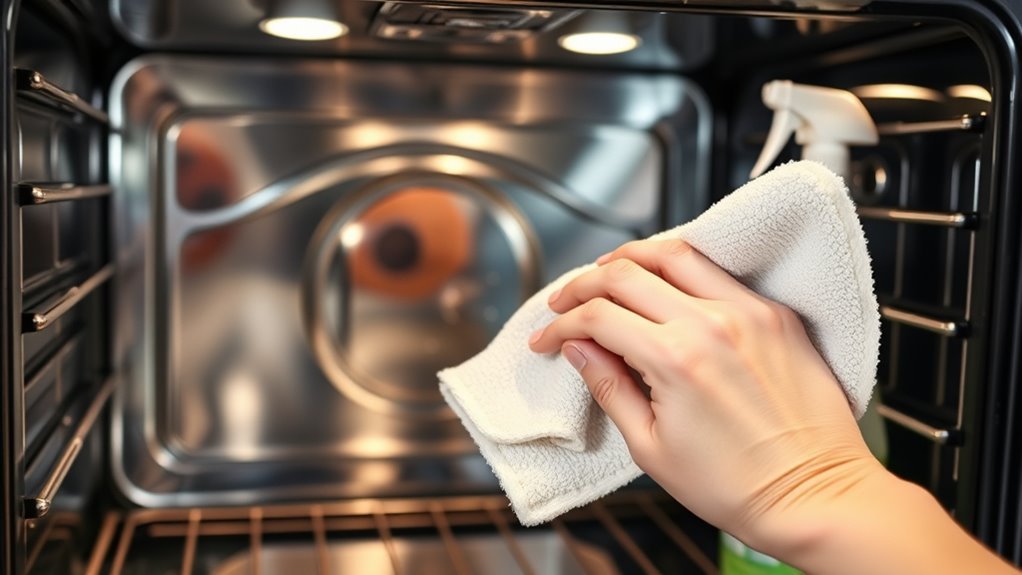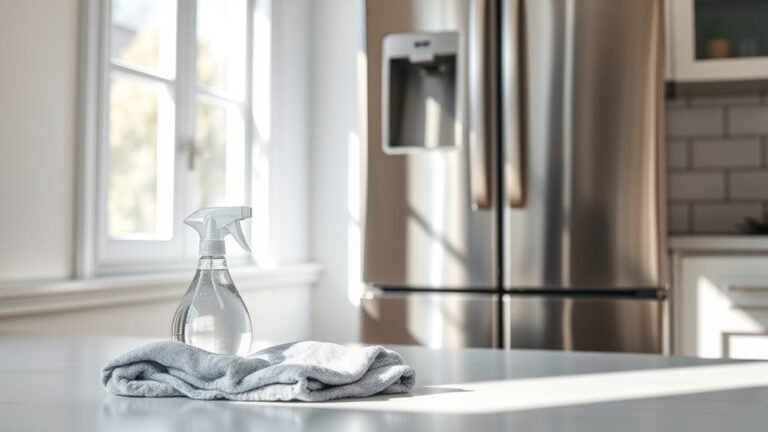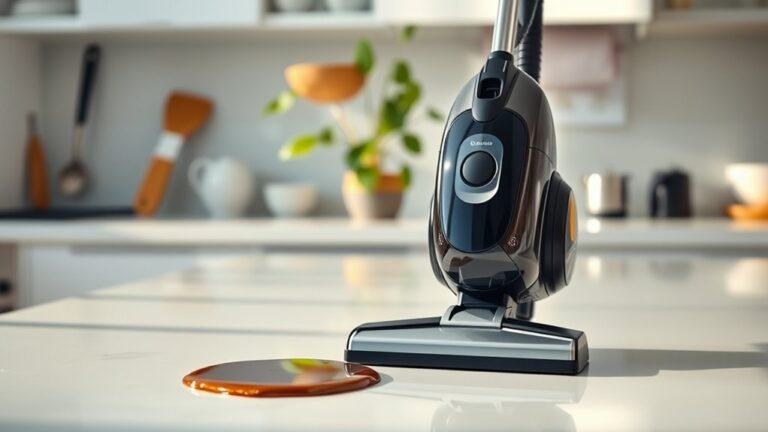Preventing Dirt Buildup on Oven
To prevent dirt buildup in your oven, make it a habit to immediately wipe spills with a damp cloth and use mild cleaners for greasy spots. Cover your dishes to reduce splatters, and consider using oven liners to catch crumbs and drips, making cleanup easier. Regularly wipe down surfaces when cool, and schedule monthly deep cleans to avoid tough grime. Keep up with these simple steps, and you’ll find your oven stays cleaner with less effort. Learn more about maintaining your oven effectively.
Understanding Common Causes of Oven Dirt Buildup

Although you might not notice it right away, everyday cooking habits are the main cause of dirt buildup in your oven. When you use various baking techniques, especially those involving high heat, food splatter becomes inevitable. Droplets of sauces, grease, or batter can land on the oven’s interior surfaces, gradually accumulating into stubborn grime. Over time, this buildup not only looks unpleasant but can affect your oven’s performance. If you want to maintain your freedom from tedious deep cleaning sessions, understanding these causes helps you adjust your cooking style. Simple measures, like covering dishes or wiping spills promptly, can greatly reduce grime formation. Taking control of how your oven gets dirty empowers you to keep it cleaner and ready for your next culinary adventure.
Choosing the Right Oven Cleaning Products
When picking oven cleaning products, you’ll want to contemplate non-toxic options that’re safe for your home. It’s important to know the difference between abrasive and gentle cleaners to avoid damaging your oven’s surface. Also, choosing eco-friendly cleaners can keep both your oven and the environment in good shape.
Non-Toxic Cleaning Options
Since harsh chemicals can damage your oven and pose health risks, choosing non-toxic cleaning products is a smart move. You want freedom from toxins and stubborn grime, right? Try these simple, effective options:
- Mix a vinegar solution with water to cut through grease effortlessly.
- Sprinkle baking soda on tough spots, then spray with vinegar for a fizzy, natural scrub.
- Use a soft cloth or sponge—no harsh scrubbing needed.
- Rinse thoroughly with warm water to leave your oven fresh and chemical-free.
These choices protect your health and your oven’s surface while giving you control over what goes into your home. Embrace the freedom of cleaning without compromise. You’ll feel better knowing your kitchen stays safe and sparkling.
Abrasive vs. Gentle Products
Choosing the right cleaning product plays a big role in keeping your oven both clean and undamaged. When deciding between abrasive cleaners and gentle cleaners, it’s important to weigh their effects. Abrasive cleaners can quickly tackle stubborn grime, but they might scratch or wear down your oven’s surfaces if you’re not careful. On the other hand, gentle cleaners work more slowly but preserve your oven’s finish, giving you peace of mind and freedom from damage. If you want to maintain your oven’s longevity without constant worry, opting for gentle cleaners is often the smarter choice. Still, you can use abrasive cleaners occasionally, just avoid overdoing it. Balancing these options helps you keep your oven spotless while protecting it for the long haul.
Eco-Friendly Oven Cleaners
Although you might be tempted to grab any cleaner off the shelf, eco-friendly oven cleaners offer a safer, more sustainable way to keep your oven spotless. By choosing products with natural ingredients or homemade solutions, you free yourself from harsh chemicals and their harmful effects. Here’s why going green matters:
- You protect your health by avoiding toxic fumes.
- You reduce environmental impact, preserving the planet’s freedom.
- You often save money with simple homemade ingredients like baking soda and vinegar.
- You enjoy peace of mind knowing your kitchen stays safe for family and pets.
Embracing eco-friendly cleaners means choosing freedom—from chemicals, cost, and worry—while keeping your oven gleaming naturally.
How to Clean Spills Immediately
When spills happen in your oven, the best way to keep dirt buildup at bay is to clean them up right away. Your spill response should be swift—don’t wait for the oven to cool completely if the spill is manageable with caution. Immediate action prevents stubborn stains and burnt-on messes, saving you effort later. Use a damp cloth or sponge to wipe away fresh spills, and if it’s oily or sticky, a mild, eco-friendly cleaner can help. Avoid harsh scrubbing that might damage your oven’s surface. By tackling spills promptly, you maintain a cleaner oven effortlessly and enjoy the freedom of cooking without worrying about tough cleanup. Staying on top of spills means less buildup and a kitchen that feels open and carefree.
Using Oven Liners for Easy Maintenance

A few well-placed oven liners can make your cleaning routine much simpler. By using liners, you access oven liner benefits that save you time and effort, giving you more freedom to enjoy cooking rather than scrubbing. These liners catch spills and crumbs before they stick and bake on, meaning easy maintenance is always within reach. Here’s why you’ll love them:
- They prevent stubborn stains and burnt-on messes.
- Cleaning becomes quick—just lift and wipe the liner.
- They protect your oven’s interior, extending its life.
- They give you peace of mind, so you cook freely without worry.
With oven liners, you gain control over your kitchen’s cleanliness and reclaim your time effortlessly.
Regularly Wiping Down Oven Surfaces
Regularly wiping down your oven surfaces keeps dirt and grease from building up and turning into tough-to-remove grime. By making this a part of your daily habits, you free yourself from long, exhausting cleaning sessions later. Stick to a simple cleaning schedule—wipe spills immediately after the oven cools and give the entire interior a quick wipe weekly. Use a damp cloth with mild detergent or a natural cleaner to avoid harsh chemicals. This routine not only maintains your oven’s efficiency but also gives you peace of mind, knowing your kitchen stays fresh and ready for whatever you want to cook next. Staying consistent lets you enjoy the freedom of a clean oven without the hassle of stubborn buildup.
The Importance of Self-Cleaning Cycles

Keeping up with daily wiping helps prevent grime, but sometimes you need a deeper clean to tackle stubborn residues. That’s where the self-cleaning cycle comes in, giving you freedom from scrubbing and harsh chemicals. The self cleaning benefits include:
- Effortless cleaning—just start the cycle and let your oven do the work.
- High heat burns off grease and food particles, leaving a fresh interior.
- Saves you time and energy for things you truly enjoy.
- Maintains your oven’s efficiency and extends its lifespan.
To maximize these benefits, consider your cycle frequency carefully. Running self-cleaning cycles too often wastes energy, but skipping them allows buildup. Aim for a balanced schedule based on your cooking habits, and enjoy a cleaner oven without the hassle.
Tips for Cleaning Oven Racks and Accessories
To keep your oven racks and accessories spotless, start by soaking them in warm, soapy water to loosen stubborn grime. Then, use the right scrubbing tools, like a non-abrasive brush or sponge, to gently remove residue without damaging the surface. These simple steps will make your cleaning routine much easier and more effective.
Soaking Techniques
Although scrubbing oven racks and accessories can be a chore, soaking them first makes the job much easier. You’ll free yourself from stubborn grime by using the right soaking solutions and respecting the soaking duration. Here’s how to reclaim your time and energy:
- Fill a container or bathtub with hot water and a chosen soaking solution, like baking soda and vinegar or dish soap.
- Submerge the racks and accessories completely to soak.
- Let them sit for at least 2-4 hours, or overnight for tough buildup.
- After soaking, you’ll find dirt softened and ready to wash away effortlessly.
Scrubbing Tools
Once your oven racks have soaked long enough to loosen grime, the right scrubbing tools will make cleaning much faster and less frustrating. You’ll want to pick scrubbing pads tough enough to remove baked-on food but gentle enough to avoid scratching. Cleaning brushes with sturdy bristles help reach tight corners and crevices, freeing you from stubborn dirt.
| Tool Type | Best For | Tip |
|---|---|---|
| Scrubbing Pads | Flat surfaces | Use circular motions |
| Cleaning Brushes | Corners & grates | Apply moderate pressure |
| Steel Wool | Heavy buildup | Use sparingly to avoid damage |
Scheduling Deep Cleaning Sessions
Keeping your oven in top shape means setting aside regular times for deep cleaning sessions. Establishing a cleaning schedule frees you from last-minute scrambles and stubborn grime. Here’s how to build a maintenance routine that fits your lifestyle:
Regular oven cleaning sessions prevent last-minute scrambles and keep grime at bay with a simple maintenance routine.
- Pick a consistent day each month for deep cleaning to make it a habit.
- Set reminders on your phone to avoid forgetting these important sessions.
- Break down the task into small steps to prevent feeling overwhelmed.
- Reward yourself afterward to associate cleaning with positive feelings.
Frequently Asked Questions
Can I Use Vinegar to Prevent Oven Dirt Buildup?
You can definitely use vinegar to help with cleaning your oven. Vinegar benefits include cutting through grease and grime naturally, making it a smart choice in your cleaning techniques. While it won’t stop dirt from building up entirely, regular vinegar sprays can make cleaning easier and keep your oven fresher. You’ll feel more in control of your space, enjoying freedom from harsh chemicals and stubborn stains.
How Often Should I Replace My Oven Liners?
Oh, sure, keep that oven liner forever—you’ll have a vintage relic to pass down! But seriously, depending on oven liner types, you should replace yours when it’s warped, torn, or no longer non-stick. Maintenance tips? Give it a good clean after every few uses and avoid abrasive scrubbing. Remember, your freedom-loving self deserves a hassle-free kitchen, so don’t hesitate to swap out old liners every 6-12 months for peak performance.
Are Natural Cleaning Products as Effective as Chemical Ones?
You might wonder if natural alternatives match chemical ones in cleaning efficacy. While natural products like vinegar or baking soda can be pretty effective and less harsh, they sometimes need more elbow grease or time. If you value freedom from harsh chemicals and want a safer environment, they’re a great choice. However, for tough grime, chemical cleaners might work faster. Ultimately, it depends on your priorities and how much effort you’re willing to put in.
Can Baking Soda Help Prevent Oven Odors?
You might think baking soda’s just for baking, but it’s actually great for odor elimination in your oven. Its natural baking soda benefits include neutralizing smells without harsh chemicals, so you can enjoy a fresher kitchen without breathing in toxins. Just sprinkle some inside your oven when it’s cool, and it’ll absorb odors, giving you freedom from funky smells while keeping things simple and safe.
Is It Safe to Clean the Oven Door Glass Regularly?
Yes, it’s safe to clean the oven door glass regularly, and it’s actually a smart move for glass maintenance. Keeping up with oven cleaning prevents grime buildup, making your oven look fresh and work efficiently. Just use gentle, non-abrasive cleaners so you don’t scratch the surface. Regular care means you won’t have to tackle tough stains later, giving you more freedom to enjoy cooking without the hassle of deep cleaning.






